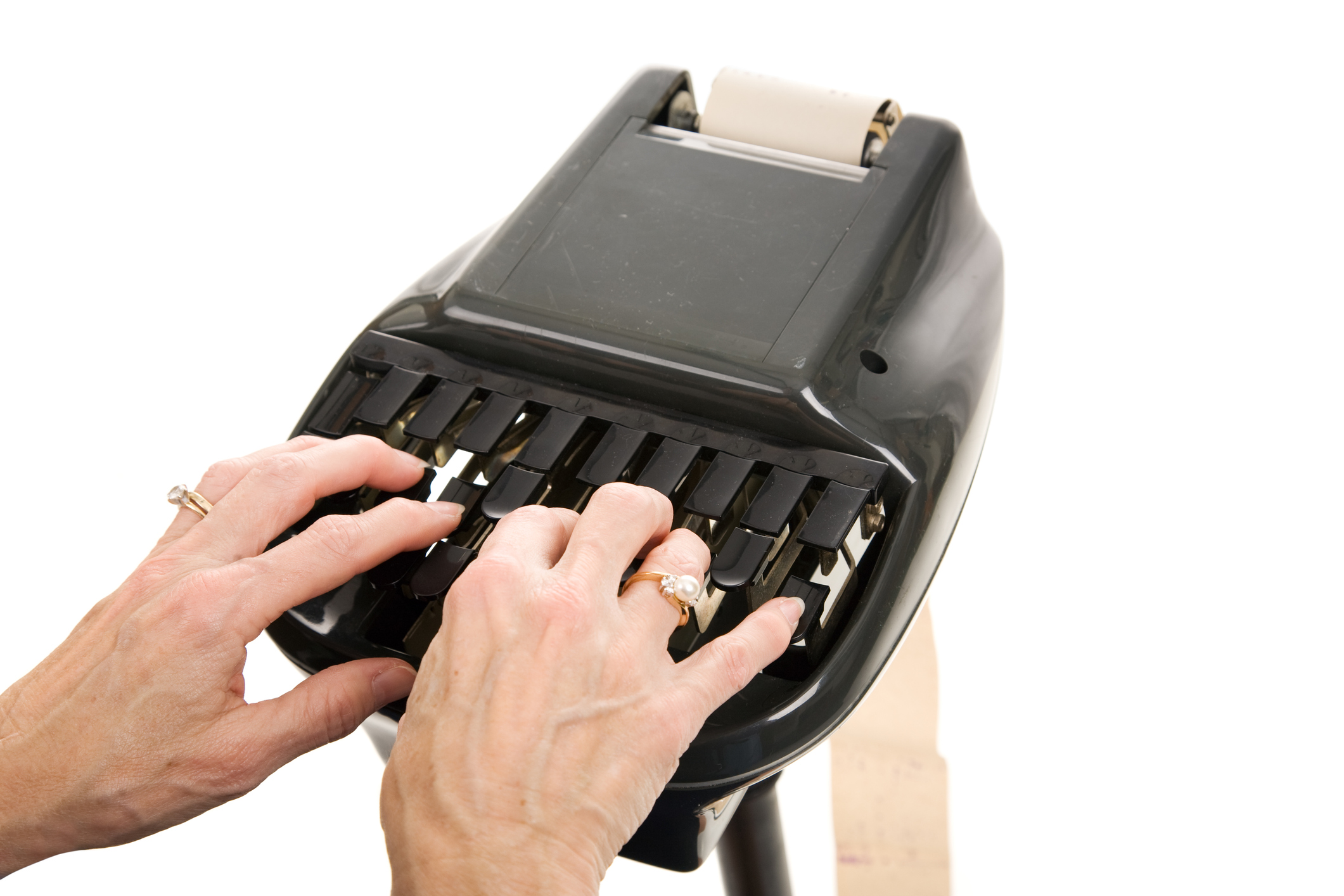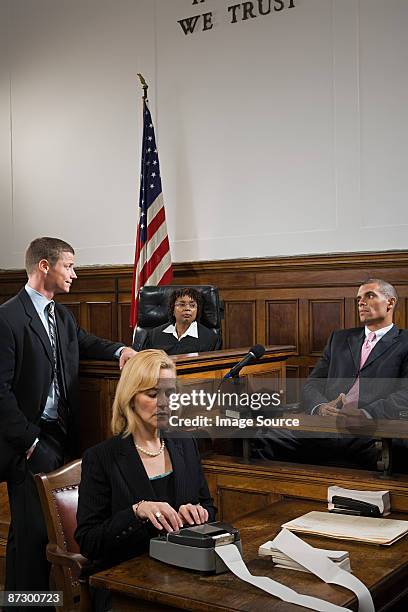The Role of a Court Typist in Important Trials
The Role of a Court Typist in Important Trials
Blog Article
Comprehending the Duty of a Court Typist: Trick Duties and Career Course Insights
As a court typist, you play an important role in the judicial system, ensuring that every word spoken in court is properly recorded. Your responsibilities surpass just typing; they entail taking care of delicate files and maintaining rigorous discretion. Understanding your duties is vital to guiding with this profession effectively. What credentials and abilities do you really require to excel, and what job courses can you pursue? Allow's explore.
Introduction of the Court Typist Role
A court typist plays an essential duty in the legal system, ensuring that all talked proceedings are properly documented. You're the one who records the nuances of court room discussion, translating spoken exchanges into created records - court typist. This isn't practically typing; it has to do with realizing the intricacies of legal language and procedures. You typically work under pressure, needing to maintain emphasis while deadlines loom.Your interest to information is paramount, as also the smallest error can have substantial implications. You have to also be acquainted with the technology utilized in courtrooms, from dictation tools to transcription software.Moreover, you belong to a bigger group, teaming up carefully with courts, legal representatives, and various other court authorities. Your work adds to the openness and honesty of the judicial process. Comprehending your function aids you appreciate the influence you carry guaranteeing justice is served with exact documentation
Key Duties of a Court Typist
While you might believe the function of a court typist is only concerning typing, it encompasses a variety of crucial obligations that assure the legal procedure runs smoothly. You'll be in charge of recording depositions, trials, and hearings precisely, making certain every information is recorded. You'll additionally assess and check records for mistakes, maintaining a high level of accuracy and clarity.In addition to transcription, you'll arrange and submit lawful papers, making them quickly available for courts and lawyers. You might need to aid in preparing instance documents and upgrading records as required. Reliable communication is crucial, as you'll typically collaborate with lawful workers to clarify info or collect needed details.Your function additionally consists of taking care of target dates, so timely completion of papers is important. By satisfying these responsibilities, you play a vital component in guaranteeing and sustaining the judicial system that lawful proceedings are recorded appropriately.
Important Skills for Court Typists
Effective court typists possess a distinct collection of skills that enhance their capacity to do effectively in a fast-paced lawful environment. Firstly, strong typing abilities are vital; you'll require to type promptly and precisely to stay on par with court procedures. Interest to information is vital, as also minor errors can have considerable consequences.You should likewise have a strong understanding of legal terms, which allows you to precisely record files and keep clearness. Outstanding business skills are vital for managing numerous cases and making certain deadlines are met.Moreover, great interaction abilities help you engage properly with judges, lawyers, and various other court personnel. Lastly, flexibility is key; you'll commonly experience unforeseen scenarios that need fast reasoning and analytical. By honing these vital abilities, you'll place on your own for success as a court typist in the lawful field.
Educational Certifications and Educating

To end up being a successful court typist, you'll need a strong instructional history, commonly consisting of a senior high school diploma or equivalent. Relevant keying accreditations can improve your qualifications and boost your task potential customers. Additionally, on-the-job training possibilities can aid you acquire the useful abilities needed for this role.
Important Educational History

Relevant Keying In Accreditations
While having a strong instructional structure is essential, obtaining appropriate typing qualifications can significantly enhance your certifications as a court typist. Certifications like the Qualified Expert Secretary (CPS) or the Registered Professional Assistant (RPS) demonstrate your efficiency and commitment to the occupation. These qualifications not only confirm your typing rate and accuracy yet also display your understanding of legal terminology and record formatting essential in court setups. In addition, going after specialized training courses in legal transcription can better refine your skills, making you an extra competitive candidate. By purchasing these certifications, you show potential companies your commitment to excellence and your readiness to take care of the demands of a court typist function properly. This proactive method can profoundly improve your career potential customers.
On-the-Job Training Opportunities
As you start your trip to become a court typist, on-the-job training uses important experience that matches your official education and learning. You'll likely begin in a supportive role, trailing skilled typists and finding out the ropes of court treatments, terminology, and software. This hands-on experience assists you establish essential skills, such as accurate transcription and time management.Many courts offer structured training programs that enable you to practice under genuine conditions, improving your self-confidence and effectiveness. You'll additionally get aware of numerous legal files and court room procedures, offering you a benefit in your job. Welcome these opportunities, as they'll not just improve your keying abilities however likewise develop your expert network within the legal community, setting you up for future success.
Profession Path and Advancement Opportunities
Court typists frequently find themselves on a promising job course with different development chances. As you acquire experience and enhance your skills, you may relocate right into functions like lead typist or supervisor, overseeing a group of typists. With additional training, you could specialize in lawful transcription or court coverage, which usually provides higher wages and higher responsibilities.You might additionally think about seeking accreditations that can set you apart from the competitors. Networking with attorneys can open doors to extra sophisticated positions, such as management functions in law companies or notary positions.As you remain to develop your know-how in legal terms and innovation, opportunities in related areas like paralegal job or legal help may additionally occur. By being aggressive and seeking added training, you can significantly expand your occupation options and possibly change into higher-level lawful roles.
The Value of Accuracy in Legal Transcription
Because even a little mistake can modify the meaning of a paper, precision in legal transcription is vital. Your accuracy straight influences court process and can influence the outcomes of cases when you're transcribing. By utilizing the right tools, you can boost your precision and guarantee that every detail is captured correctly.
Precision in Lawful Records
The accuracy of papers usually makes the distinction between a case lost or won when you think about the legal system. As a court typist, you are accountable for transcribing lawful process with outright precision. Every word, spelling mark, and format information issues. A single error More Help can result in misunderstandings, false impressions, or also endanger a client's case. You should stay concentrated, pay attention diligently, and have a comprehensive understanding of legal terminology. In addition, keeping discretion is crucial, as you manage sensitive information. Your duty isn't nearly inputting; it's about ensuring the honesty of lawful records. By honing your abilities and focusing on precision, you contribute greatly to the performance of the legal system and the pursuit of justice.
Influence on Court Proceedings
The success of court procedures depends upon the precision of lawful transcription. When you record court hearings, every word matters. A solitary error can lead to misunderstandings, influencing the end result of situations. If you misinterpret a vital statement or misspell a crucial term, it can change the whole context of the dialogue. Juries, lawyers, and juries rely upon your work to make educated choices based upon the evidence offered. Your focus to detail guarantees that the official document shows real procedures, providing clearness and accountability. By preserving high criteria in your transcription, you contribute greatly to the stability of the legal procedure. Ultimately, your function is crucial in maintaining justice and assuring that every voice is precisely stood for in court
Devices for Accurate Transcription
To nail precise transcription in the court, you need the right devices at your fingertips. A high-grade transcription software can considerably boost your efficiency, enabling you to record every word specifically. Buy a trusted headset to filter out background sound and warranty quality in audio recordings. A foot pedal can also accelerate your process, allowing you regulate playback hands-free. In addition, maintaining a substantial lawful thesaurus or glossary helps you rapidly reference terminology, ensuring you do not miss out on crucial information. It's essential to have a comfy, try this out ergonomic workstation to decrease distractions and fatigue during long sessions. By equipping yourself with these important tools, you'll boost your accuracy and contribute successfully to the lawful process.
Workplace and Task Outlook for Court Typists
Court typists flourish in dynamic environments, frequently situated within bustling courthouses or legal offices. You'll discover yourself surrounded by attorneys, from legal representatives to judges, all working with each other to ensure justice is offered (court typist). Your office may be fast-paced, needing you to adjust swiftly to varying needs, whether it's recording court procedures or preparing legal documents.As for the work expectation, the need for court typists continues to be constant as a result of the continuous requirement for precise documentation in lawful settings. While innovation has automated some transcription jobs, knowledgeable court typists who can manage complex lawful terminology and maintain precision are still highly valued. Numerous typists also have possibilities for innovation within the lawful field, developing right into functions such as administrative aides or legal assistants. Your interest to information and ability to function under pressure will certainly be important for your success in this substantial function
Frequently Asked Concerns
What Tools or Software Program Do Court Typists Commonly Use?
Court typists normally use transcription software application, word processing program like Microsoft Word, and specialized court reporting tools. You'll likewise count on foot pedals and premium headsets to boost precision and efficiency in your transcription tasks.
Just How Does One Find Job Openings for Court Typists?
To discover work openings for court typists, examine online job boards, legal internet sites, and court system career pages. Connecting with experts in the field can additionally bring about unadvertised opportunities you may not find or else.

What Is the Ordinary Wage for a Court Typist?
The typical wage for a court typist varies by place and experience, yet you can expect it to vary from $35,000 to $55,000 annually. Research study neighborhood job listings to get a far better sense of wages.
Are There Certifications Available for Court Typists?
Yes, there are qualifications available for court typists. You can go after specialist visit this site courses that improve your abilities, like lawful transcription or court reporting accreditations, which can improve your job opportunities and reputation in the field.
Can Court Typists Job From Another Location or Freelance?
Yes, court typists can function remotely or freelance, especially with improvements in modern technology. You'll find opportunities in transcription services or legal firms that enable adaptable work plans, adjusting to your timetable and choices. As a court typist, you play an important role in the judicial system, making sure that every word talked in court is properly recorded. Networking with lawful specialists can open up doors to extra innovative positions, such as administrative functions in legislation firms or court clerk positions.As you continue to build your competence in lawful terminology and innovation, chances in associated fields like paralegal work or legal support may also occur. Your work area may be fast-paced, needing you to adjust swiftly to differing demands, whether it's transcribing court proceedings or preparing lawful documents.As for the work expectation, the need for court typists stays stable due to the ongoing demand for specific documents in legal settings. Court typists generally use transcription software, word processors like Microsoft Word, and specialized court coverage devices. To find job openings for court typists, examine on the internet job boards, lawful internet sites, and court system occupation pages.
Report this page